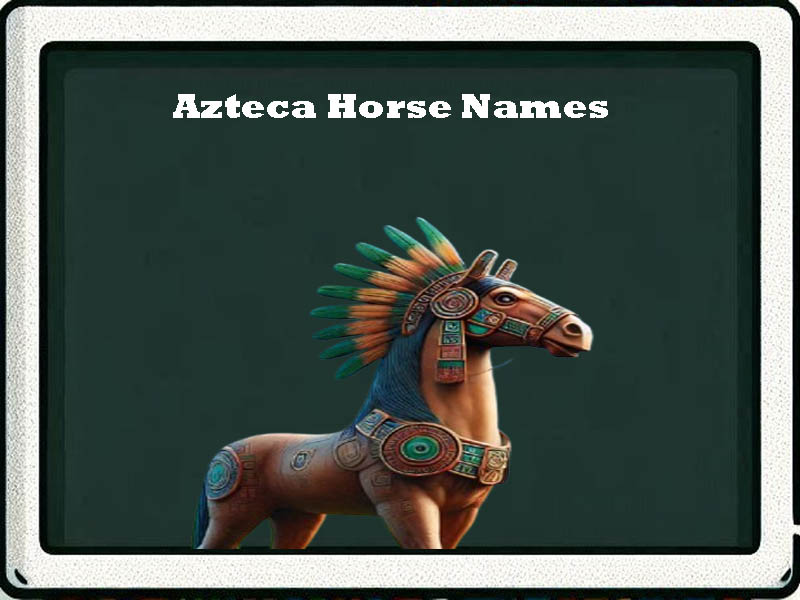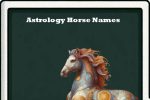100 Azteca Horse Names for Your Equine Companion
Azteca horse names reflect the elegance and heritage of this remarkable horse breed, known for its strength, agility, and cultural significance.
Originating from Mexico, the Azteca horse is a unique blend of Spanish and local influences, making it a prized breed for both work and sport.
Whether naming a spirited mare or a powerful stallion, these horse names carry a sense of tradition and grace. The rich history of this horse breed ensures that each name embodies the spirit and legacy of the Azteca horse, creating a connection between the horse and its timeless origins.
Here are 100 Azteca horse names inspired by Aztec culture, mythology, and history, split into Male and Female categories. Each name includes its meaning or significance.
Azteca Horse Names, Male
- Quetzalcoatl – The feathered serpent god of wisdom and wind.
- Huitzilopochtli – God of war and the sun.
- Tezcatlipoca – The smoking mirror, a god of night and destiny.
- Tlaloc – God of rain and fertility.
- Xolotl – God of fire and lightning, often associated with dogs.
- Cuauhtémoc – The last Aztec emperor, meaning “descending eagle.”
- Itzcoatl – An emperor, meaning “obsidian serpent.”
- Ahuitzotl – A mythical water creature resembling a dog.
- Ocelotl – Meaning “jaguar,” a symbol of strength.
- Tonatiuh – Sun god and leader of the heavens.
- Atl – Meaning “water” in Nahuatl.
- Chicomecoatl – God of sustenance and maize.
- Coyotl – Meaning “coyote,” a cunning animal.
- Tlacaelel – A historical figure who shaped Aztec ideology.
- Iztli – Meaning “obsidian,” a sacred material.
- Nahuatl – The language of the Aztecs.
- Mixcoatl – God of hunting and stars.
- Ehecatl – God of wind, a gentle force of nature.
- Tecuani – Meaning “beast” or “wild animal.”
- Tepanecatl – A warrior title meaning “lord of the hill.”
- Ixtli – Meaning “face” or “eyes,” symbolizing identity.
- Yohualli – Meaning “night,” a mystical time.
- Tlalli – Meaning “earth,” representing stability.
- Zolin – Meaning “quail,” a bird known for its agility.
- Malinalli – A day in the Aztec calendar, representing grass.
- Olin – Meaning “movement,” a cosmic principle.
- Xihuitl – Meaning “turquoise” or “year.”
- Teocuitlatl – Meaning “divine excrement,” referring to gold.
- Hueyatl – Meaning “big water” or ocean.
- Tochtli – Meaning “rabbit,” a calendar sign.
- Cuauhtli – Meaning “eagle,” a powerful symbol.
- Coatl – Meaning “snake,” a sacred animal.
- Tecuhtli – Meaning “lord” or “noble.”
- Metztli – Moon god, a mysterious figure.
- Xochipilli – God of art, beauty, and dance.
- Ihuicatl – Meaning “sky” or “heavens.”
- Teotl – Meaning “god” or “divine essence.”
- Huemac – A legendary ruler of the Toltecs.
- Acamapichtli – The first Aztec emperor.
- Tlilpotonqui – Meaning “feathered in black,” a warrior name.
- Xiuhcoatl – Meaning “fire serpent.”
- Yaotl – Meaning “enemy” or “warrior.”
- Necalli – Meaning “battle” or “war.”
- Tlaltecuhtli – The earth goddess, symbolizing creation.
- Tocatl – Meaning “spider,” a symbol of patience.
- Tlatoani – Title for the ruler, meaning “speaker.”
- Océlotl-Tecuani – Meaning “jaguar warrior.”
- Papalotl – Meaning “butterfly,” symbolizing transformation.
- Mictlantecuhtli – God of the underworld.
- Xipilli – Meaning “precious jewel.”
Azteca Horse Names, Female
- Xochitl – Meaning “flower,” symbolizing beauty.
- Coyolxauhqui – Moon goddess, representing femininity.
- Chalchiuhtlicue – Goddess of rivers and lakes, meaning “jade skirt.”
- Itzel – Meaning “rainbow lady.”
- Malintzin – A historical figure, known as Malinche.
- Mayahuel – Goddess of fertility and agave.
- Tonantzin – Meaning “revered mother.”
- Tlalli – Meaning “earth,” symbolizing grounding.
- Mictlancihuatl – Queen of the underworld.
- Yohualticitl – Goddess of childbirth.
- Azcatl – Meaning “ant,” symbolizing diligence.
- Tonalnan – Meaning “mother of light.”
- Cihuacoatl – Goddess of motherhood and war.
- Acatl – Meaning “reed,” a day sign.
- Matlalcueitl – Goddess of rain and fertility.
- Izel – Meaning “unique” or “special.”
- Eztli – Meaning “blood,” symbolizing life force.
- Ihuicatl – Meaning “heavenly sky.”
- Xilonen – Goddess of young maize.
- Tlazolteotl – Goddess of purification.
- Nahui – Meaning “four,” a sacred number.
- Anacaona – Meaning “golden flower.”
- Tlapalli – Meaning “paint,” symbolizing art.
- Xiuhnel – Meaning “turquoise fire.”
- Tecpatl – Meaning “flint,” a day sign.
- Chimalma – Mother of Quetzalcoatl.
- Tozi – Goddess of healing and sweat baths.
- Huexolotl – Meaning “turkey,” a sacred bird.
- Mixi – Short for Mixcoatl, goddess of stars.
- Zyanya – Meaning “forever” or “always.”
- Necahual – Meaning “survivor.”
- Citlalicue – Goddess of the Milky Way.
- Xochiquetzal – Goddess of love and fertility.
- Atlacoya – Goddess of drought.
- Teyolia – Meaning “divine heart.”
- Cihuapilli – Meaning “princess.”
- Olin – Meaning “movement” or “earthquake.”
- Metztli – Goddess of the moon.
- Cozamalotl – Meaning “rainbow.”
- Tlapalcalli – Meaning “painted house.”
- Teicuih – Meaning “younger sister.”
- Toci – Goddess of grandmotherly wisdom.
- Xilotl – Meaning “young maize cob.”
- Icnoyotl – Meaning “friendship.”
- Nenetl – Meaning “doll.”
- Ome – Meaning “two,” symbolizing duality.
- Cuicatl – Meaning “song.”
- Tianquiztli – Meaning “marketplace” or “stars.”
- Chantico – Goddess of the hearth.
- Citlali – Meaning “star.”
Azteca Horse Names: Celebrating Tradition, Strength, and Cultural Heritage
Azteca horse names embody the grace, strength, and cultural depth of the Azteca horse, a magnificent horse breed that bridges tradition and modernity.
This breed, a perfect combination of the Andalusian horse, Spanish Mustang, and Criollo, carries the legacy of Spain while thriving in Mexico.
Naming these horses often draws inspiration from the Spanish language, Aztec religion, and timeless themes like beauty, the moon, and mythical deities such as Tezcatlipoca, Quetzalcoatl, and Huītzilōpōchtli.
Whether you have a spirited stallion, a reliable gelding, or a graceful mare, these names resonate with the horse’s personality and origins. For example, Tecpatl signifies “flint knife” in Aztec culture, while Xiuhcoatl translates to “fire serpent,” evoking strength and agility.
Inspired by Miguel de Cervantes and Bree, Middle-earth, creative names can reflect both literary and fantastical worlds, adding a unique flair to your Azteca horse.
In equestrianism, these horses excel in dressage, horse racing, and horse shows, where their agility and poise captivate audiences. Their purebred lineage ensures a standard of excellence celebrated by veterinarians and breeders alike.
Whether participating in a horse show or galloping under the moonlight, these horses showcase unmatched elegance.
The enduring legacy of Azteca horse names reminds us of the harmonious blending of cultures and traditions, making each name a testament to the horse’s noble spirit and the artistry of the horse breed it represents.
The Azteca horse shares some similarities with the Mustang, a breed known for its wild spirit, and the Lipizzan, renowned for its beauty and precision in dressage.
The language of horse naming, deeply rooted in Spanish language and Aztec religion, continues to inspire names like Xipe Totec, the god of spring and renewal, symbolizing the Azteca horse’s resilience and vitality.




-0 Comment-